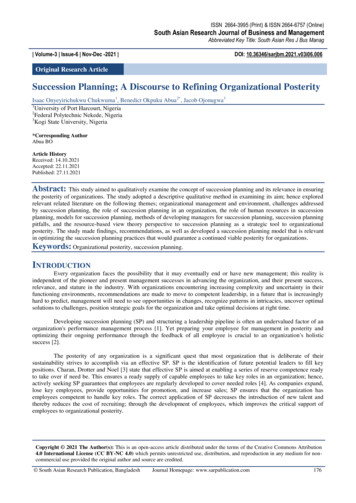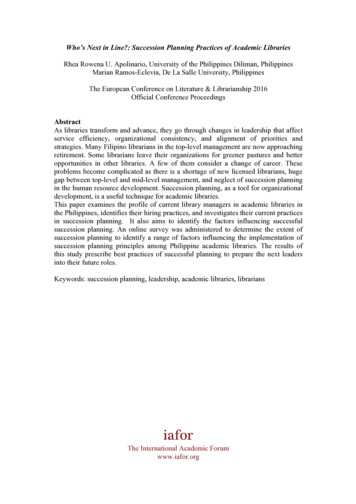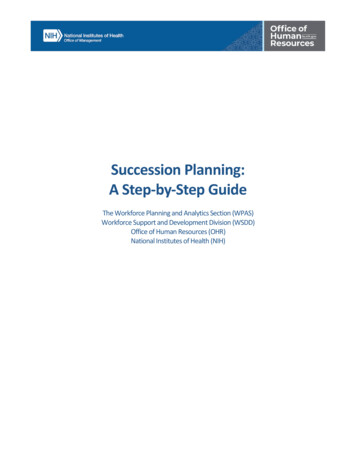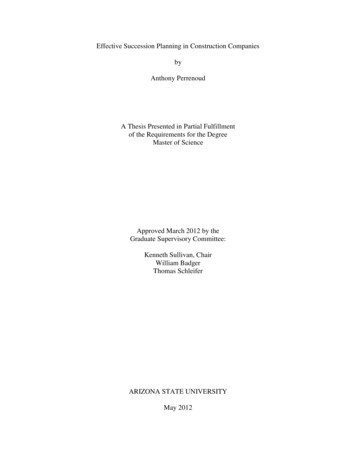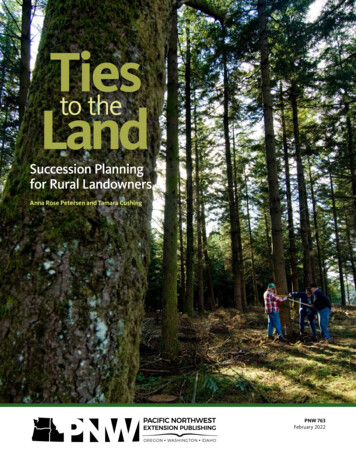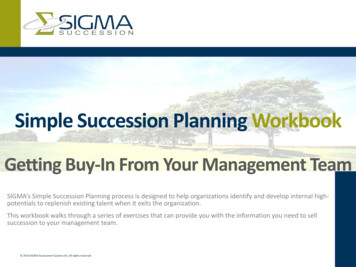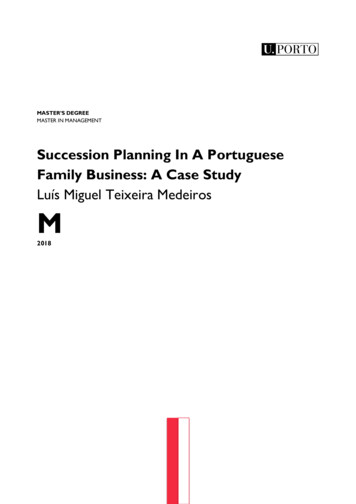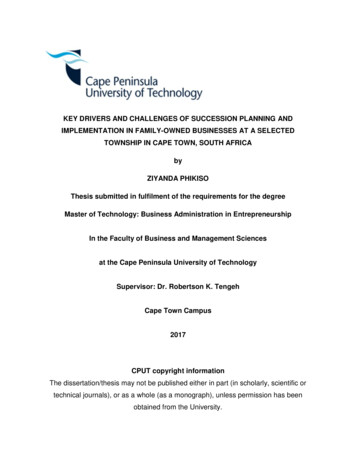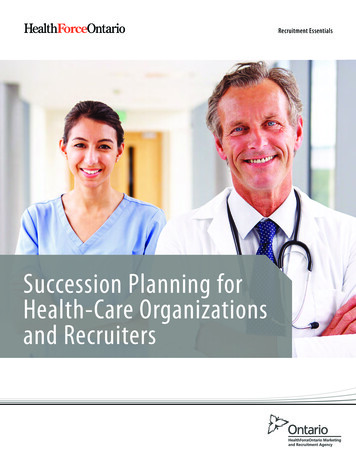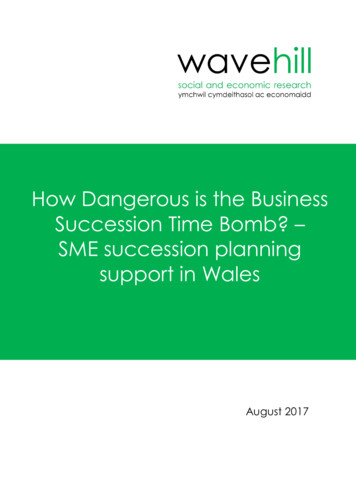
Transcription
How Dangerous is the BusinessSuccession Time Bomb? –SME succession planningsupport in WalesAugust 2017
Wavehill Ltd. Wales office: 21 Alban Square, Aberaeron, Ceredigion, SA46 0DB (registered office)West England office: 217 Paintworks, Arnos Vale, Bristol, BS4 3AHContact details:Tel:01545 571711Email: info@wavehill.comTwitter: @wavehilltweetsMore vehilltweets Wavehill Ltd. This report is subject to copyright. The authors of the report (Wavehill Ltd.)should be acknowledged in any reference that is made to its contents.
Authors:Eva TrierDr Andrew EngeliOliver AlliesIoan TeifiAnna BurgessAny questions in relation to this report should be directed in the first instance to OliverAllies (oliver.allies@wavehill.com)Date of document: 16th August 2017Version: Final DraftClient contact:Brace Griffiths, Senior Manager Entrepreneurship Policy and ProjectsBrace.Griffiths@gov.wales
Contents1234Introduction . 61.1Background to this study . 61.2Study aims . 71.3Methodology . 8Business succession planning in Wales . 92.1Policy context. 92.2SME perspectives on succession planning . 122.3Current succession planning support environment in Wales . 132.4Access to support for different cohorts of SMEs . 28Targeting of different SME cohorts . 353.1Considerations in the Welsh policy context . 353.2Insights from the Scottish model . 37Conclusions and recommendations . 384.1Conclusions . 384.2Recommendations . 40Appendix 1 – SME cohorts in the context of policy objectives . 42Appendix 2 – The Scottish Enterprise Succession Programme . 44
Executive summaryIn March 2017, the Welsh Government and the Wales Co-operative Centre commissionedWavehill to undertake research and analysis into the business succession issues facingbusinesses in Wales, focusing on two aspects: The support requirements of the Welsh SME sector with regard to generalist businesssupport around succession planning and implementation, and The benefits and opportunities afforded by heightened awareness of, and support for,transforming businesses into employee ownership as part of a planned successionapproach.The Wales Co-operative Centre and the Welsh Government have identified that there areserious economic and social costs associated with business succession failure which can beavoided by planning and implementing a considered succession strategy. Elements of theWelsh economy may be particularly affected by this, because: It relies, to some extent, on micro-businesses of fewer than 10 employees, which areoften more dependent on the founder and, therefore, more difficult to sell; Rural areas depend more heavily on the sustainability of key employers, who mighteither close or leave the area as a result of succession.Study aimsThe requirement for the study was to undertake market research and analysis using primaryand secondary data to examine the demographic and psychographic profiles of businessesand their owners in Wales, their succession aspirations and levels of knowledge of theoptions available.Alongside this, the brief included a requirement to map out the range of existing supportpackages that are available to support business owners in their succession planning process,and to provide recommendations for the most appropriate support packages that can bepromoted and delivered through the wider Business Wales service offer.MethodologyThe methodology adopted for this study combined primary and secondary researchapproaches as follows: A desk review considering the policy context and existing research for SME successionplanning to inform the research framework for the subsequent SME survey and thestakeholder interviews; A survey of SMEs in Wales was undertaken to understand succession planning needs andtheir experiences with the existing succession planning support infrastructure;1
Stakeholder interviews with those providing succession planning support for SMEs inWales to identify gaps in support provision; All research results were triangulated to identify where market failures in relation tosuccession planning in Wales existed. Recommendations for the most appropriatesupport packages that could be promoted and delivered through the wider BusinessWales service offer were developed on that basis, including for the promotion ofemployee ownership models.Business succession planning in WalesBusiness succession planning needs to be framed in the wider context of economic policyobjectives for Wales. In Wales, the Programme for Government commits the WelshGovernment to the pursuit of ‘a stronger, fairer economy, improved and reformed publicservices, and a united, connected, and sustainable Wales’.The SME sector is essential to the Welsh economy. An important focus rests onunderstanding how the longer-term development of SMEs in Wales can be encouraged andsupported and what effects different succession approaches are likely to have on thenurturing of a Welsh ‘Mittelstand’. Understanding the prospects and choices for successionplanning by Welsh SMEs and planning for the survival and growth of SMEs once theowner(s) withdraw(s) from the business is an important part of this.The services delivered via Business Wales play a crucial role in ensuring that the WelshGovernment contributes to the success of SMEs in Wales, and the RegionalEntrepreneurship Acceleration Programme (REAP) can be expected to further strengthenthe alignment of the support with economic policy objectives.Three quarters of SMEs who responded to the survey, which formed part of this study andfocused on businesses of between five and 50 employees, had not planned for the fulltransfer of ownership/closure of the business at all. Family ownership is a prevalentownership structure in this cohort of SMEs.Current succession planning support environment in WalesThe stakeholder interviews clearly highlighted the way in which succession planning needsto combine and weave together a plethora of different perspectives, dimensions andrequirements in order to satisfy the needs of the different stakeholders involved whilefinding a viable solution for the business and the outgoing owner(s) going forward.Interviewees overwhelmingly agreed that very little provision was in place in the currentsuccession planning support landscape to invite and encourage business owners to engagewith the subject in a timely way. Succession planning needs to have more prominence inpublic debate and owner-managers’ mindsets as an essential stage in any business’ lifecycle.2
SME owners tend to have very limited awareness of different succession options and theirimplications. Without the benefit of a strong Board, they often do not have the knowledgeand skills of identifying and assessing the quality of more specific detailed advice.Support is often targeted at businesses with at least 1 million or, depending on the source, 2 million or even 5 million in turnover. Limited understanding combined with affordabilitytherefore means that SMEs often find it difficult to engage with the support that is availableto consider options and prepare the business for a transfer of ownership.Finance Wales and the Wales Co-operative Centre are able to cater to businesses that donot fit into these categories to some extent, but their reach into the SME communityremains limited by the resources available and the limited attention SMEs pay to the issue.Business Wales is able to make business owners aware of the issue to some extent and ageneral consideration of owners wishing to exit the business at some point is likely to bepart of broader business planning in one-to-one advice.A gap analysis in terms of the skills and attitudes needed to drive the business forward,followed by mentoring, is an essential ingredient in business succession support. Both areavailable to a limited extent only.Business succession crucially depends on being able to access and secure appropriatefinance, including retirement planning. Access to capital was seen as not being an issue,including for Management Buy-Outs, but a finance gap exists where an SME’s value is noteasily visible to buyers or investors.Many SME owners have unrealistic expectations regarding the price of their business andhave a limited understanding of the detailed tax, legal and due diligence implications ofselling their business. Support is available, but may not be appropriate or affordable forsmaller SMEs. Professional advisors’ knowledge of the specific opportunities related to anEmployee Buy-Out is limited.Access to support for different cohorts of SMEsA key task in addressing the issue of succession planning for SMEs in Wales consists inidentifying different SME cohorts’ specific needs and opportunities in relation to successionplanning.A focus on ‘deals’ in the professional community directs attention towards SMEs with astrong existing strategic proposition. This cohort was estimated to be somewhere in theregion of 5% of SMEs in Wales. Access to support is further likely to be affected for a largemajority of SMEs in Wales by the business models adopted by professional advisors. As aresult, the majority of SMEs do not prioritise succession planning themselves and are not onthe radar of professional services’ marketing efforts either.There is a risk that SMEs that may offer particular opportunities to anchor businessownership and the associated economic activity and employment in Wales may not bereached by this support and not catered to adequately. Business growth as the key criterionfor both the allocation of public sector-sponsored enterprise and business support and3
interest from financial institutions and investors may not be sufficient in identifying SMEsthat are important within their local economic structure.A backlog from the 2008 financial crisis and the age structure of SME owners in Wales canbe expected to create additional pressures to make succession planning support morewidely available to those SMEs that do not, as a matter of course, seek out such support.Overall, even recognising that some SMEs are genuinely too small or too niche to warrantany succession support, a considerable number of SMEs in Wales are therefore not beingalerted to the need to plan for succession and/or potentially find it difficult to access orafford appropriate support. And yet, from a public policy perspective, these SMEs have aconsiderable contribution to make to sustaining the overall vibrancy of the Welsh economy.The notion of ‘building value’ through a staged process of planning for and implementing atransfer of ownership is likely to be highly relevant to many of these businesses.Two main market failures can be identified that prevent SMEs in Wales from taking upoptimum levels of succession planning support:1. A structural market failure exists in the sense that the valuation of a business for a saleor investment proposition may not adequately reflect the value of that business to thelocal economy in terms of employment and the vibrancy of the local economy.2. Information-related market failures exist in the sense that owners are not sufficientlyaware of the different succession options and their implications and, therefore, do notembark on succession planning at an early enough point in time.Targeting of different SME cohortsWider Welsh Government economic development policy objectives and links to theWellbeing of Future Generations pledges should be kept in mind in deciding which cohortsof SMEs should be targeted with additional succession planning support.A focus on nurturing the kind of entrepreneurial culture that uses strong managementdisciplines to underpin business growth and to promote the skills base to feed into theoverall business stock in Wales can help to reconcile potentially conflicting economic policyobjectives.A useful segmentation of SMEs in relation to their specific succession planning needs mustgo beyond an analysis that is purely based on aspects such as the age of owner-managers orcompany size. While such markers will help to identify businesses that may face successionissues in the near future, limiting the analysis to this level would not be conducive tomaximising the possible contribution of a focus on succession planning for the Welsheconomy.The Scottish model offers a template of how succession planning can be delivered in a waythat takes an in-depth understanding of an individual SME’s specific situation as its startingpoint and tailors a response to the particular requirements.4
Conclusions and recommendationsSuccession planning has an important role to play in delivering on economic policyobjectives in Wales. Much of the specialised technical support for succession planning ascalled for by SMEs is available in principle.Unrealistic SME expectations regarding the value of their business and the likelihood offinding a buyer who is willing to pay a ‘strategic premium’ for the business in a trade salerequire a focus on awareness raising of other options such as an MBO or employeeownership as alternatives.A gap in market-based provision for smaller SMEs and those requiring more intensivesupport in strengthening their strategic position by ‘building value’ needs to be addressedby strengthening narratives around strategic business development as an essentialingredient in SME growth and resilience throughout the business life cycle.Identifying SMEs that would warrant public sector-sponsored succession planning supportneeds to go beyond simplistic markers such as turnover or the age of the owner(s) and totake into account the business’ strategic outlook, its position in the market and itscontribution to the local economic fabric.Finance Wales and the Wales Co-operative Centre have strong visibility in the context ofsuccession planning support for SMEs and were repeatedly identified as agencies that couldpotentially play a greater role in succession planning, while there is an opportunity forBusiness Wales to further strengthen the way in which one-to-one interactions with SMEsare levered to communicate such messages to the wider SME community.Recommendation 1: Develop a clear policy statement regarding the importance of SMEsuccession planning for the Welsh economy.Recommendation 2: Confirm and enhance the Business Wales offer to support SMEsuccession planning and ensure that all Business Wales advisors have the requisite skills tosupport general SME succession planning.Recommendation 3: Work collaboratively amongst the Welsh Government, FinanceWales, the Wales Co-operative Centre and the professional advisor community to run a jointawareness-raising campaign, promoting the diversity of succession options and creating anintegrated offer.5
1 IntroductionSection Summary Mounting anecdotal evidence that Welsh SMEs facing succession planning issues couldbe detrimental to the Welsh economy as a whole motivated this research, which wascommissioned jointly by the Wales Co-operative Centre and the Welsh Government. The Welsh economy was seen to be especially vulnerable to SME succession failure,because it is reliant on micro-businesses and rural areas depend heavily on keyemployers. The study undertook market research using primary and secondary data to examineSMEs’ succession aspirations and knowledge, and mapped existing support packages. A particular focus in the research rested on considering the potential to promoteemployee ownership approaches to the betterment of the Welsh economy.1.1 Background to this studyIn March 2017, the Welsh Government and the Wales Co-operative Centre commissionedWavehill to undertake research and analysis into the business succession issues facingbusinesses in Wales, focusing on two aspects: The support requirements of the Welsh SME sector with regard to generalist businesssupport around succession planning and implementation, and The benefits and opportunities afforded by heightened awareness of, and support for,transforming businesses into employee ownership as part of a planned successionapproach.Commissioning the research was motivated by the realisation that there was mountinganecdotal evidence suggesting that Welsh SMEs are facing succession planning issues thatcould potentially be detrimental to the Welsh economy as a whole. This research willcontribute to both the Welsh Government’s and the Wales Co-operative Centre’sunderstanding of the scale of the problem and designing relevant approaches to address it.Business succession occurs in Small and Medium-Sized Enterprises (SMEs) when ownermanagers decide to exit a company, often because they wish to retire after building up abusiness, sometimes over many decades. Many successful businesses fail every yearbecause succession is handled badly. Some estimates suggest that a third of all businessclosures can be seen as succession failures.6
The owner exiting the business is an essential part of the business life cycle: from theowner’s perspective in that only with appropriate, timely attention will they have a realisticchance of realising their investment in the business; from employees’ perspective in thattimely attention can secure a business’ strategic position in the market; and from theperspective of the Welsh economy as a whole in that the employment and wealth creationprovided by SMEs can only be retained and higher rates of SME growth achieved ifsuccession planning becomes part of a full understanding of the SME business life cycle.The Wales Co-operative Centre and the Welsh Government have identified that there areserious economic and social costs associated with business succession failure which can beavoided by planning and implementing a considered succession strategy. Elements of theWelsh economy may be particularly affected by this, because: It relies, to some extent, on micro-businesses of fewer than 10 employees, which areoften more dependent on the founder and, therefore, more difficult to sell.Rural areas depend more heavily on the sustainability of key employers, who mighteither close or leave the area as a result of succession.1.2 Study aimsThe requirement for the study was to undertake market research and analysis using primaryand secondary data to examine the demographic and psychographic profiles of businessesand their owners in Wales, their succession aspirations and levels of knowledge of theoptions available.Alongside this, the brief included a requirement to map out the range of existing supportpackages that are available to support business owners in their succession planning process,and to provide recommendations for the most appropriate support packages that can bepromoted and delivered through the wider Business Wales service offer.A particular focus in the research rested on considering the potential to promote employeeownership approaches to the betterment of the Welsh economy. Employee ownershipoffers a succession strategy that is suitable for many business owners; however, it is notwidely promoted by professional business advisors, despite tax incentives and a growingbody of evidence that demonstrates the success of the approach.Building on the ‘Defusing the Business Succession Time-bomb’ publication released by theWales Co-operative Centre in 2012, this part of the study required an update of the policy,taxation and legislative environment for employee ownership that would allow theinterpretation and contextualisation of the evidence gathered within UK and Welshdevolved economic policy.7
1.3 MethodologyThe methodology adopted for this study combined primary and secondary researchapproaches as follows: A desk review was undertaken to consider the policy context for SME successionplanning, identify existing research and develop a research framework for thesubsequent SME survey and the stakeholder interviews. A survey of SMEs in Wales was undertaken to understand SMEs’ succession planningneeds and their experiences with the existing succession planning support infrastructure. Stakeholder interviews were undertaken with a cross-section of stakeholders providingsuccession planning support for SMEs in Wales to identify gaps in support provision. All research results were triangulated to identify where market failures in relation tosuccession planning in Wales existed. Recommendations for the most appropriatesupport packages that could be promoted and delivered through the wider BusinessWales service offer were developed on that basis, including for the promotion ofemployee ownership models.8
2 Business succession planning inWalesSection Summary Business succession planning needs to be framed in the wider context of economicpolicy objectives for Wales. In Wales, the Programme for Government commits theWelsh Government to the pursuit of ‘a stronger, fairer economy, improved andreformed public services, and a united, connected, and sustainable Wales’. The SME sector is essential to the Welsh economy. An important focus rests onunderstanding how the longer-term development of SMEs in Wales can be encouragedand supported and what effects different succession approaches are likely to have onthe nurturing of a Welsh ‘Mittelstand’. Understanding the prospects and choices forsuccession planning by Welsh SMEs and planning for the survival and growth of SMEsonce the owner(s) withdraw(s) from the business is an important part of this. The services delivered via Business Wales play a crucial role in ensuring that the WelshGovernment contributes to the success of SMEs in Wales, and the RegionalEntrepreneurship Acceleration Programme (REAP) can be expected to furtherstrengthen the alignment of the support with economic policy objectives. Three quarters of SMEs who responded to the survey, which formed part of this studyand focused on businesses of between five and 50 employees, had not planned for thefull transfer of ownership/closure of the business at all. Family ownership is a prevalentownership structure in this cohort of SMEs.2.1 Policy context2.1.1 Economic policy objectivesBusiness succession planning needs to be framed in the wider context of economic policyobjectives for Wales. Key amongst those objectives in Wales, the UK and the widerdeveloped world are productivity and economic growth on the one hand and widersustainability considerations (from social justice and equitable outcomes to environmentalprotection) on the other hand.A 2017 House of Commons Briefing Paper 1 identifies plans for a new Industrial Strategy asbeing key amongst UK government policies to strengthening the UK economy. Theintroduction to the associated Green Paper suggests that the strategy is ‘about coordinatinga wide range of economic policies to achieve particular objectives, which need not be purelyeconomic. For example, an industrial strategy can have social and environmental aims.’212House of Commons Library (2017), Productivity in the UK, Briefing Paper Number 06492House of Commons Library (2017), Industrial strategy, Briefing Paper Number 07682, 31 January 20179
The document makes a distinction between horizontal and sectoral policies and introducesthe notion of mission-driven policies.Business support, including a consideration of SME succession planning, clearly belongs inthe category of horizontal policies, but is also inspired by the mission to stimulate economicgrowth in a way that benefits people in different parts of the country and in differentindustries while adding to the vibrancy of the economy overall.In Wales, the Programme for Government commits the Welsh Government to the pursuit of‘a stronger, fairer economy, improved and reformed public services, and a united, connected,and sustainable Wales’3. The focus of economic policy is neatly summed up in the CabinetSecretary for the Economy and Infrastructure’s 2016 invitation to stakeholders to contributetheir observations and ideas for the priorities of the economy, answering the questions ofhow Wales’ economy can be improved, to grow prosperity and deliver greater financialsecurity to businesses and individuals, and how more home-grown, innovation-drivenenterprise can be developed4.Welsh Government is currently developing four cross-cutting and intertwined strategiesunder the four main headings of ‘Prosperous and secure’, ‘Healthy and active’, ‘Ambitiousand learning’ and ‘United and connected’. The aim is to work collaboratively with a widerange of interested partners and embed preventative thinking and long-term approaches inpolicymaking while considering how the Welsh Government can use the levers available tohave the greatest impact5.Alongside this, sustaining business confidence at a time of great uncertainty (following theBrexit referendum) is a key priority for the Welsh Government. This includes businessengagement alongside more tangible interventions such as the launch of the WelshGovernment Growth and Prosperity Fund6.The services delivered via Business Wales play a crucial role against this backdrop inensuring that the Welsh Government contributes to the success of start-ups and SMEs inWales. With a focus on growth businesses, the service offers a broad range of scalablesupports catering to start-ups and SMEs in different settings and environments.Also under the Business Wales umbrella, the work that is currently undertaken under thebanner of the Regional Entrepreneurship Acceleration Programme (REAP) can be expectedto further strengthen the alignment of the support with economic policy objectives, as theyrelate to the Welsh business support network, underpinning entrepreneurship, innovation,and job creation.3Welsh Government (2016), Taking Wales Forward 2016-2021See conomy/priorities-for-the-economy/?lang en5Council for Economic Renewal (2016), Discussion on Programme for 20-cfer-item-5-en.pdf6Council for Economic Renewal (2016), Discussion on Programme for 20-cfer-item-5-en.pdf410
This sits alongside a renewed focus on the availability of finance for SMEs, as exemplified inthe 2013 Access to Finance Review and the plans for Finance Wales to evolve into theDevelopment Bank of Wales, which will be tasked with providing more than 1 billion ofinvestment support to Welsh business over the next five years. Ensuring that micro- tomedium businesses in Wales have greatly improved access to finance, support services andmanagement advice is a key objective for the new Development Bank.2.1.2 Focus on SMEsThe SME sector is essential to the Welsh economy. Making up 99% of the business count,SMEs account for 62% of private sector employment in Wales7. The vital importance ofSMEs in Wales is reflected in the Welsh Government’s ongoing commitment to providingsupport and finance to SMEs. Over 50 million to be distributed by the WG and FinanceWales to help SMEs to expand (including a fund to support management buy-outs of highgrowth-potential SMEs) was announced over the course of 2016.A recent report by the FSB identified priorities for enhanced provision for SMEs, includingbetter access to finance, but also raised the need to support training and business skills.Importantly, the report also calls for measures to ‘allow Welsh owned SMEs to grow intomajor employers without necessitating ownership (and therefore control) being lost tooutside Wales’8.And yet, a subsequent FSB-sponsored report 9 considering the lack of a ‘Mittelstand’ inWales identified the early exit of owner-managers followed by ‘churning of ownership’ as akey issue. The report recommends an overhaul of UK-wide policies supporting lending andequity investment in SMEs and tax incentives for investors and entrepreneurs.Similar sentiments are voiced by contributors to a TUC publication debating Industrial Policyin Wales, which suggests that ‘SMEs generate pass the parcel employment when the familysells out and the firm is passed between corporates like Rachel’s Dairy which has successivelyhad American and French owners’10. Another contributor deplores ‘a low level of policycommitment to supporting and developing the role of indigenous employers, particularly inmanufacturing and in the broad-based SME sector. Local supply chain development and thefostering of SME growth, merger and consolidation can provide significant employmentpotential.’An important focus therefore rests on understanding how the longer-term development ofSMEs in Wales can be encouraged and supported and what effects different successionapproaches are likely to have on the nurturing of a Welsh ‘Mittelstand’.7Welsh Government (2016), Size analysis of Welsh businesses statistical first rel
embark on succession planning at an early enough point in time. Targeting of different SME cohorts Wider Welsh Government economic development policy objectives and links to the Wellbeing of Future Generations pledges should be kept in mind in deciding which cohorts of SMEs should be targeted with additional succession planning support.
